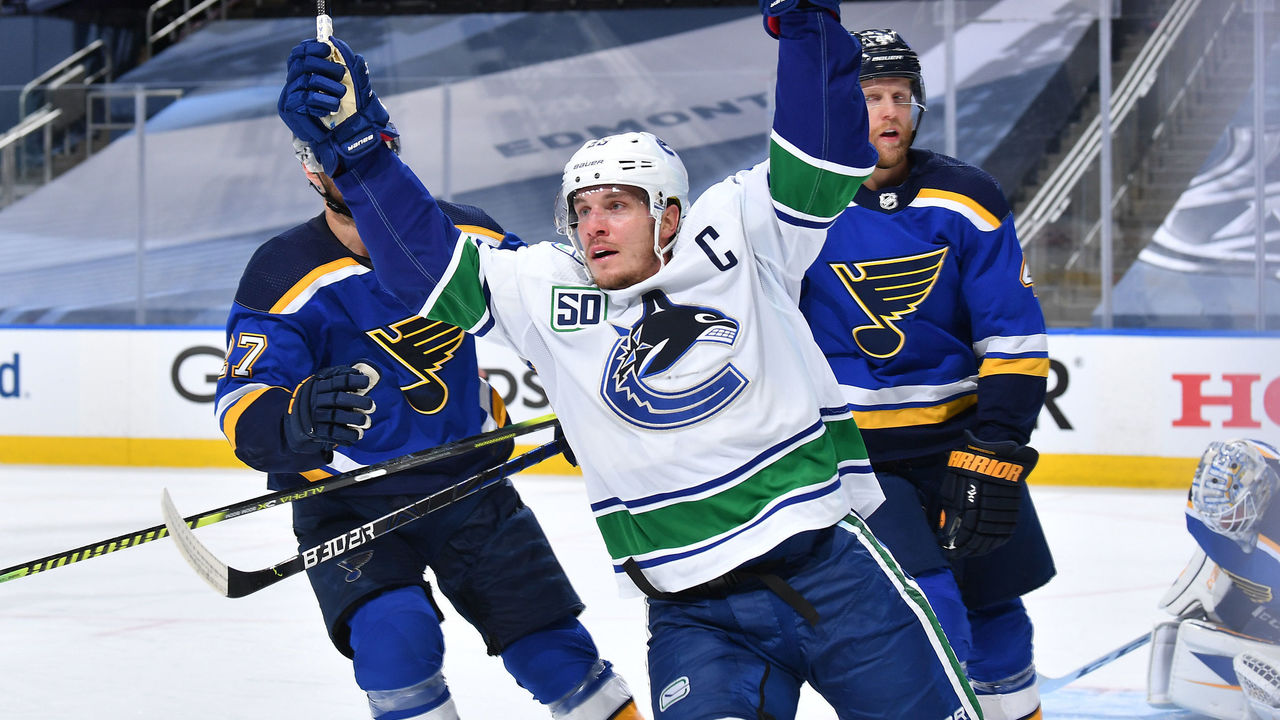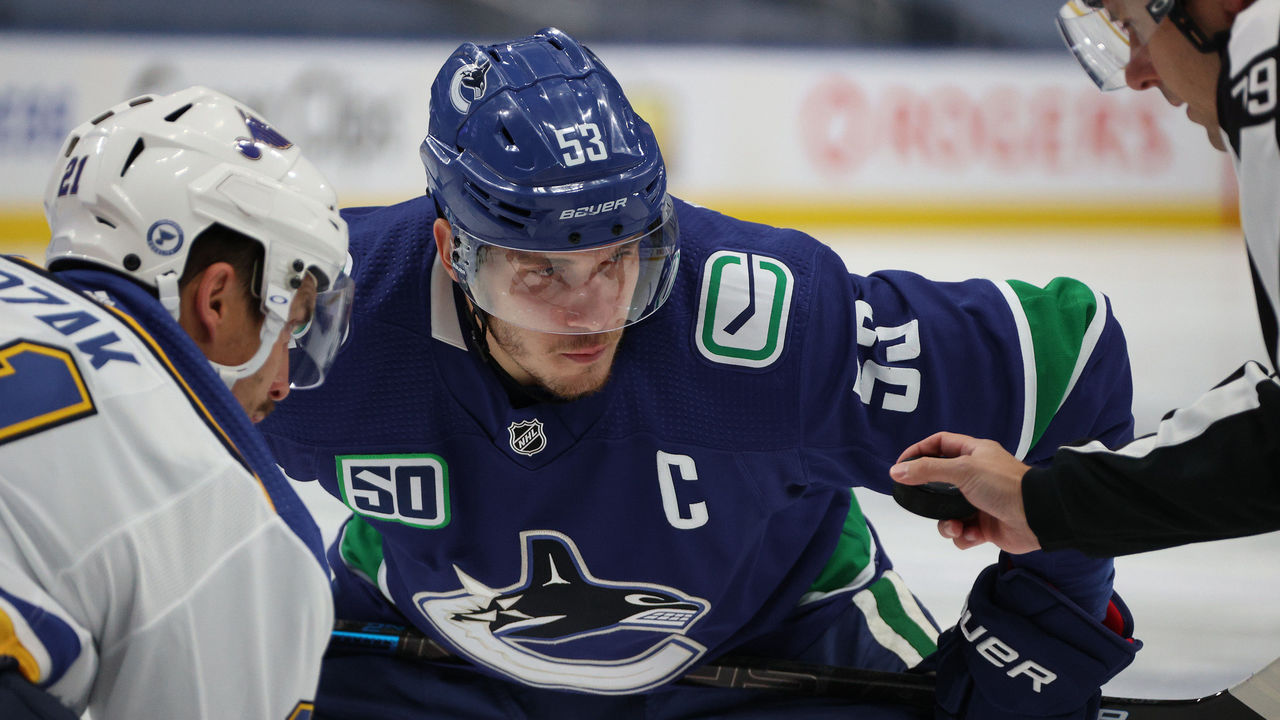Bo Horvat led this Canucks core to its playoff breakthrough
Tim Horvat was downstairs in his basement in Rodney, Ontario, well after midnight a couple of weekends ago when his older son - the captain of the Vancouver Canucks - glided into frame on the big screen, tracking the puck on the forecheck in the Minnesota Wild's end.
Six minutes remained in Game 4 of Vancouver's playoff qualifier series, a matchup slated to wrap that night if the Canucks could overcome a late one-goal deficit. Not since 2011, smack in the middle of the Sedin brothers' heyday, had the Canucks won a round of any kind, a long wait for a titleless franchise and the mission of the center counted on to fill the twins' vacated leadership role.
With a little help from friend and foe - Tanner Pearson battling behind the net; Minnesota's Kevin Fiala watching the puck a little too closely - Bo Horvat took it upon himself to end the holdup. Fiala was none the wiser as Horvat coasted behind him to the crease, and Wild goalie Alex Stalock couldn't keep him from potting Pearson's pass.
"That one got the ball rolling," Tim Horvat said by phone the other day. "It was that comeback, that tie, the overtime goal by (Chris) Tanev. I think that was when the team really started to gel."
Vancouver's still rolling, deposing the champion St. Louis Blues to move into the second round proper, and the fan base has plenty of names to salute. Tender-aged Elias Pettersson and Quinn Hughes magnetize the attention of defenders, whose targeted physicality hasn't stopped them from scoring at point-per-game rates. Pearson, J.T. Miller, and Brock Boeser have driven offense, too. At 30 years old, Jacob Markstrom had never appeared in the postseason; he now rocks a .929 save percentage and seven wins in 10 starts. Tanev eliminated the Wild with his first career playoff goal, and Tyler Motte has four of his own in the past two games.
The puck drops Sunday night on Vancouver's next best-of-seven, against a new challenge entirely in the Vegas Golden Knights. Vegas is a powerhouse, seemingly destined to meet the Colorado Avalanche in the Western Conference Final. Yet like the scrappy Dallas Stars, the Canucks can't be discounted from the outset - nor, in their particular case, written off as content to wait for the bright future that's in store for their core.
The Canucks have the air of a dark horse on the rise, unfazed by their last opponent's resume or by the magnitude of the stage. For that, a fair share of the credit goes to Horvat, already a seasoned veteran at age 25 and the first folk hero to emerge during this run.

Horvat's six goals in the bubble tied him for the NHL lead entering this round. He's scored in all situations, in spectacular fashion, and in the clutch, from the equalizer that set about Minnesota's downfall to the OT winner he cashed on the rush in Game 2 against St. Louis. That he's gone without a point since then doesn't detract from the legend he fashioned across those several days in Edmonton. The former ninth overall pick, which was acquired from New Jersey at the 2013 draft for Cory Schneider, has become the franchise's rock in pressurized times.
When the Canucks talk about their first-year captain in media availabilities, they tend to repeat certain compliments. Horvat plays smart, they say. He keeps it simple. They appreciate that he's strong on the puck down low, that he attends to all 200 feet of the ice. To put it broadly, he does a lot right. And inarguably, he shows up when needed.
"A couple of us younger guys, younger than Bo, are watching that and taking notes," Boeser said.
"There's that stereotype where you say guys are built for the playoffs. That's bang on with Bo," Pearson told reporters after Horvat's second multi-goal game early in the Blues series. "He's leading the way for us, and we're just following right now. Which we'll all do in a heartbeat."

Through two rounds, Horvat leads Vancouver forwards in ice time (21:13 per game) and defensive zone starts (43, fourth among forwards in the playoffs, according to Natural Stat Trick). While Pettersson and Hughes have been electric on the power play, Horvat's six points at even strength and shorthanded pace the team, an invaluable lift for a lineup that St. Louis outchanced heavily at five-on-five.
As for the aesthetics of how he's scored: as distant a memory as they may seem given the relentlessness of the schedule, most of his goals on Jordan Binnington are sure to feature in any postseason highlight reel.
Those goals showcased the breadth of his capabilities. Eyes popped when Horvat dangled Vince Dunn in Game 1 and walked Brayden Schenn and Jaden Schwartz on a shorthanded breakout two nights later. Scoring on those plays required speed, the awareness to attack Dunn or two backchecking forwards in space, the puck-handling dexterity to reset to his forehand off the deke, and a sweet release to beat Binnington.
Widening the playoff lens, he's also scored on a tip, a slot shot on the power play, and the one-timer that punished Fiala's inattentiveness. The winning sequence that squashed the Blues in Game 2 started with a wonderful banked stretch pass from Hughes; Horvat finished with composure on the ensuing partial breakaway.
"When Bo's on top of his game, he just does a little bit of everything," head coach Travis Green said during the Blues series. Another day, he issued this endorsement: "If anyone's made for playoff hockey, it's Bo Horvat."
Back in junior, Horvat proved as much in the months that preceded his 2013 draft day. He scored 16 goals in 21 playoff games to guide the London Knights to the Ontario Hockey League title, earning postseason MVP honors. He reserved his best for the latest possible instant: in Game 7 of the final against the Barrie Colts, Horvat broke a 2-2 tie with a netfront flick that crossed the line with 0.1 seconds left.
The goal was Nazem Kadri-esque, mirroring the buzzer-beater the Avalanche center netted to stun the Blues in the Western seeding round. No championship was on the line when Kadri struck, though. To London assistant coach Dylan Hunter, it crystallized much of what made Horvat dangerous: the faceoff he won to start the play, the impulse to get inside position at the crease, the readiness to capitalize before the horn sounded.
"It was just one of those things with that leadership capability of his: to understand the compete level (needed) at the end of the game, to want to score and want to not have to go to OT," Hunter said in an interview. He added: "And having the confidence to be the guy."
In Vancouver as in London, where his teammates in 2013 alone included future NHLers Max Domi, Josh Anderson, Chris Tierney, Olli Maatta, Nikita Zadorov, and Scott Harrington, Horvat's managed to distinguish himself on a roster replete with talent. Hunter and Canucks defenseman Troy Stecher credited him with performing the same feat years apart: bridging the generational gap inherent to any locker room - between 16- and 20-year-olds in junior, and between the likes of Pettersson and Hughes and remaining guys who played with the Sedins - and setting a tone on the ice others are keen to follow.
Horvat, admittedly, was overrun throughout the Blues series by Ryan O'Reilly; Vancouver owned a mere 26.77% of scoring chances during his extensive matchups with St. Louis' top center at five-on-five. But that disparity wasn't ultimately meaningful. The overall scoreline on those shifts was 1-1.

Taken in isolation, meanwhile, the end of the Wild series and Games 1 and 2 against St. Louis were the best Green said he's seen his captain play. To apply Stecher's preferred metaphor, Horvat seized the bull by the horns, keying those crucial first victories that backfooted the defending champs.
"Everybody's followed suit and hopped on his back," Stecher said. "That's what a leader does."
Regardless of how the Vegas matchup turns out, questions will abound once these playoffs end about the Canucks' trajectory. How much better can Pettersson and Hughes get? What pay will they command in restricted free agency next summer? What is general manager Jim Benning to do under salary-cap duress about the glut of decisions he faces this offseason, with Markstrom, Stecher, Tanev, Tyler Toffoli, and Jake Virtanen all soon to be up for new deals?
For now, those are secondary concerns in Vancouver and in Rodney, where bedtime at the Horvat house will stretch into the wee hours a while longer. After he takes in each Canucks playoff game with his wife, Cindy, and their younger son Cal, Tim Horvat's made a habit of chatting with Bo on the phone, analyzing the night's events as calm descends on the bubble and Tim waits till 3 a.m. to get to sleep.
Rodney is a 45-minute drive from London, where Tim played 12 games at forward for the Knights - Brendan Shanahan was a teammate - in the mid-1980s. He sells insulation now, but retains a player and hockey parent's insight into the forces that have gotten his son to where he is.
Self-confidence, mental toughness, and an even keel helped him shoulder the weight of the captaincy this season, Tim said. His teammates have always liked him, and those he has in Vancouver were quick studies in navigating the playoff grind. With every matchup comes new lessons in how to rise to the occasion.
"That's the best thing," Tim said. "The farther they can go, the more they learn."
Nick Faris is a features writer at theScore.